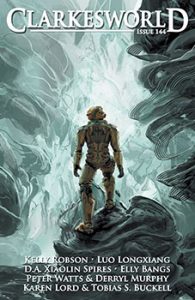Each month, Daniel Haeusser reviews short works of SFT that appear both online and in print. He is an Assistant Professor in the Biology Department at Canisius College, where he teaches microbiology and leads student research projects with bacteria and bacteriophage. He’s also an associate blogger with the American Society for Microbiology’s popular Small Things Considered. Daniel reads broadly in English and French, and his book reviews can be found at Reading1000Lives or Skiffy & Fanty. You can also connect with him on Goodreads or Twitter.
 “The Foodie Federation’s Dinosaur Farm” by Luo Longxiang, translated from the Chinese by Andy Dudak
“The Foodie Federation’s Dinosaur Farm” by Luo Longxiang, translated from the Chinese by Andy Dudak
Clarkesworld #144, September 1
“A Lei was a young worker at the 045 Meat Union factory on Continent Three in starship Rhea. When the dinosaur uprising overwhelmed the factory, he used a hunting rifle to drop two great beasts that got in his way.” The opening lines to this story (part of a special dinosaur-themed issue of Clarkesworld) immediately set the stage for readers. A segment of a far-future nomadic humanity has abandoned lab synthesized foods and returned to farming, herding, and hunting foodstuffs resurrected from the abandoned Earth. Dinosaurs are a particular delicacy, but the most coveted meat (and organs) come from a particularly intelligent species that is capable of speech, and revolt. I’m not particularly attracted to the dinosaur theme of the issue, and both the plot and tone of this story at first reminded me of something absurd that would be done in an episode of Futurama. There is even mention of one Venerable Madam Zheng Qingyin, otherwise known as “Grandma Foodie” that immediately called to mind Tress MacNeille’s “Mom”. I quickly realized there was a great deal more here to make the story’s length work perfectly, and add balance. Conversations between A Lei and the dragon Steel Teeth (Mister Wise and Farsighted Crouching Dragon) allow reflection on the biology of predator/prey interactions and the food web as well as on the structure of societies and culture. Details that try to add some science and rationale behind the rather absurd plot also help ground it into something beyond light comedy and action.
![]() “The Wind Cave” by Haruki Murakami, translated from the Japanese by Philip Gabriel
“The Wind Cave” by Haruki Murakami, translated from the Japanese by Philip Gabriel
The New Yorker, September 3
The narrator of this story recalls the death of his younger sister from heart arrhythmia at the age of twelve, when he was fifteen, and reflects on its effects on his life and what hers might have been. The speculative element to the story derives from the possible existence of alternate universes, and the randomness of day-to-day unknowns that pull us into the reality we know. With allusions to the works of Lewis Carroll that his sister had enjoyed, the narrator recounts a family trip to a wind cave near Mt. Fuji two years prior to her death. While exploring, his sister disappeared down a hole and for a moment he thought she would not be returning. In this the narrator explores the fine lines between life, death, memory, and possibility.
![]() “Children of the Endless Sea” by Suvi Kauppila, translated from the Finnish by the author
“Children of the Endless Sea” by Suvi Kauppila, translated from the Finnish by the author
Samovar Magazine, September 24
This beautiful, evocative, and sad tale is set in a seemingly future Earth where civilization has fractured through large-scale flooding that has removed most solid ground and forced life to return to the sea. The narrator and her friend Shonra are from a population that lives partially in the sea and partially on rafts, having evolved traits like scales and webbed hands, selected for by the new environment. As the narrator considers what the future and destiny hold for her life with her people, forces from both the natural world and from outside human societies come to shape her into someone unique, yet still “caught” between worlds. This fits perfectly within a self-contained story, but I could see the universe easily expand to something interesting in novel length.
![]() “Untilted” by K.A. Teryna, translated from the Russian by Alex Shvartsman
“Untilted” by K.A. Teryna, translated from the Russian by Alex Shvartsman
Samovar Magazine, September 24
A translation published last year in Apex Magazine that I only got to reading a few months back, it is now also available as a reprint this month on Samovar. Pain from the loss of a child followed by a partner leads a woman named Dahlia to contemplate suicide. But a seemingly random, and surreal encounter with an older boy named Marcus prevents her taking action. Marcus can sense her trauma, and he has crafted a note to get her attention long enough to take a step back from despair long enough to help her shed the pain through a magical music box left by his grandmother. Ultimately the story is a meditation on the trials, harm and benefits of pain, as well as a warm message about the role that helping others can take in working through otherwise unbearable difficulty.
